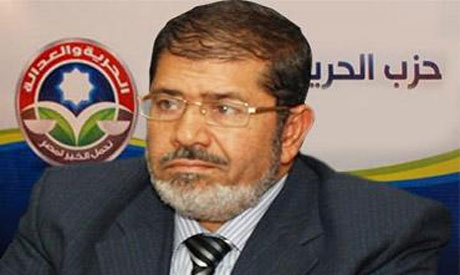 Muslim Brotherhood's presidential hopeful, Mohamed Mursi, said during a press conference on Saturday that he would resign as the chairman of the Freedom and Justice Party (FJP) should he emerge as the winner in Egypt's elections, due to start on 23 May.
Muslim Brotherhood's presidential hopeful, Mohamed Mursi, said during a press conference on Saturday that he would resign as the chairman of the Freedom and Justice Party (FJP) should he emerge as the winner in Egypt's elections, due to start on 23 May.
Brotherhood presidential candidate Mursi will resign as party chief if he wins
By-Ahram
Copts and Poliltical Islam
00:04
Monday ,23 April 2012

The news conference was held by the FJP to officially announce Mursi's presidential bid and to unveil his campaign platform.
"We announce that the FJP and the Brotherhood decided that the party and the group should have a candidate for this year's presidential elections," he stated. "We hope the Egyptian people would accept and appreciate that decision." This comes in contrast to the decision made early on by the Brotherhood after the revolution not to field a candidate so as to not look like they are purposefully trying to monopolise politics.
"The party gave much thought on the situation in Egypt before they chose me [as their presidential nominee]," Mursi said.
"The earlier decision not to field a candidate for president was made before 11 February [of the year 2011, when the uprising deposed Mubarak] ... Throughout this following year, circumstances have changed," he explained.
Mursi said the Brotherhood's long-standing slogan, "Islam is the Solution," is being implemented after the 2011 uprising toppled Mubarak's regime and paved the way for a bona fide democratic environment.
When asked, he said it is too early for him to suggest at a potential vice-president.
Mursi also coyly replied to a question over whether he would keep Field Marshal and de-facto president, Hussein Tantawi, as the Minister of Defence.
"There shall be cooperation, coordination and consultancy among the state institutes, and the right ministers should be appointed to the right ministries.
"The Ministry of Defence should decide who will lead them in the future," Mursi explained.
On the Salafist support for him, Mursi said, "Figures from the Salafist Al-Daawa (The Calling) group are currently in negotiations with many parties, including the Muslim Brotherhood's Supreme Guide, Mohamed Badie. They are yet to announce that they endorse any particular candidate."
The Salafist Nour Party has not also decided which presidential candidate to back.
Mursi, who has been the head of the FJP since it was established by the Brotherhood in May 2011, was fielded as presidential contender no sooner had doubts surrounded the eligibility of the group's original candidate, Khairat El-Shater.
Under Mubarak in 2008 (before Egypt's revolution) El-Shater was given a seven-year jail sentence by military prosecution for money laundering and funding the Brotherhood group, which operated illegally under the strict regime. Electoral rules exclude anyone from running for president who has a criminal record. Although El-Shater was recently pardoned expressly so he could excercise political rights, it was considered as too little too late and he was eventually eliminated from the presidential race. Mursi, subsequently, became the Brotherhood's sole candidate.
"The campaign platform belongs to the party and the group, not an individual," Mursi said to confirm that the platform will not differ from what was proposed under El-Shater.
"However the Brotherhood will not rule Egypt; the president will. Egypt's president must be completely independent and does not belong to any party. He should abide by the constitution and not a party code.
"That is why I would resign from the FJP should I become president."
On the much-debated peace treaty with Israel, Mursi rode both sides of the fence: "Egypt has relations and political representation in 193 countries. The president must respect his country, but at the same time must respect treaties as well."
Mursi was accepted as a presidential candidate by the Supreme Presidential Electoral Commission (SPEC) last week, along with other 12 candidates.
The other accepted candidates are diplomat and politician Amr Moussa; former commander of the Egyptian Air Force Ahmed Shafiq; prominent Islamist activist Abdel-Moneim Abul-Fotouh; ex-deputy director of intelligence, Hossam Khairallah; Nasserist opposition figure, Hamdeen Sabbahi; prominent reformist judge Hisham El-Bastawisi; international law PhD Abdallah El-Ashaal; socialist and labour activist, Abul-Ezz El-Hariri; renowned lawyer and activist Khaled Ali; Islamic thinker and writer Mohamed Selim El-Awa; former police officer Mahmoud Hossam and police expert Mohamed Fawzy.
Presidential elections will take place on 23 and 24 May and the president will be named on 21 June after a runoff-voting round, if needed, on 16 and 17 June.


